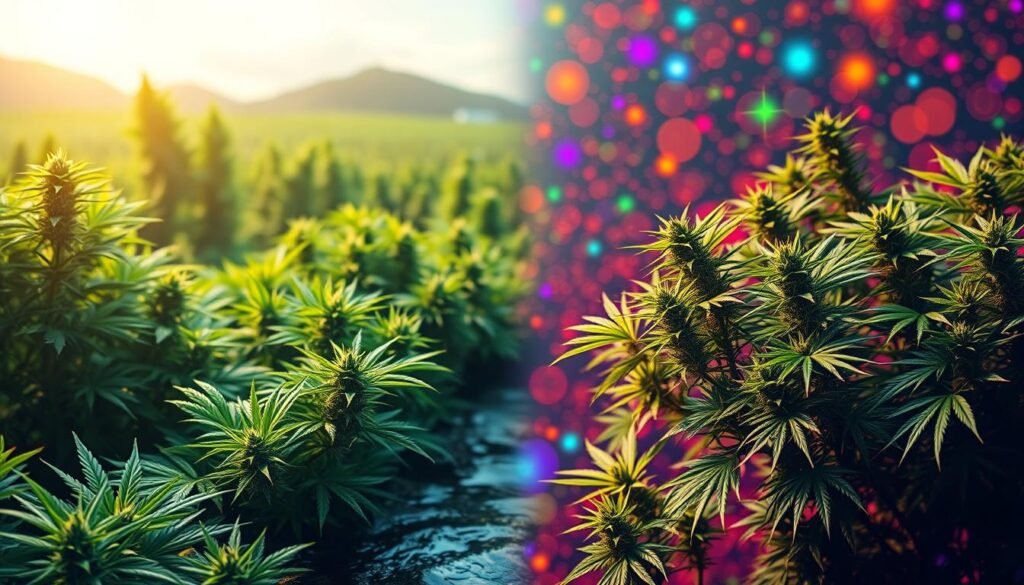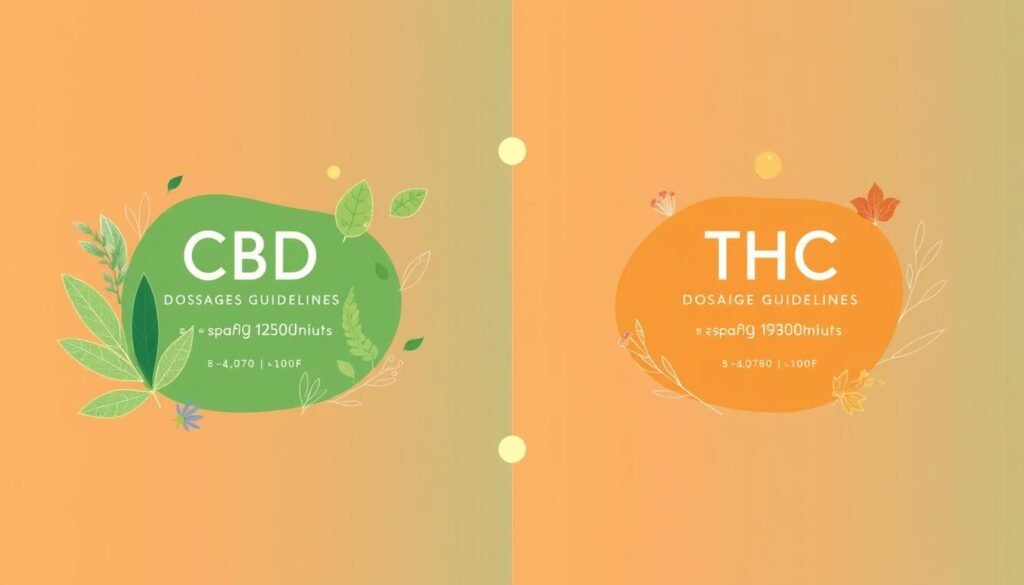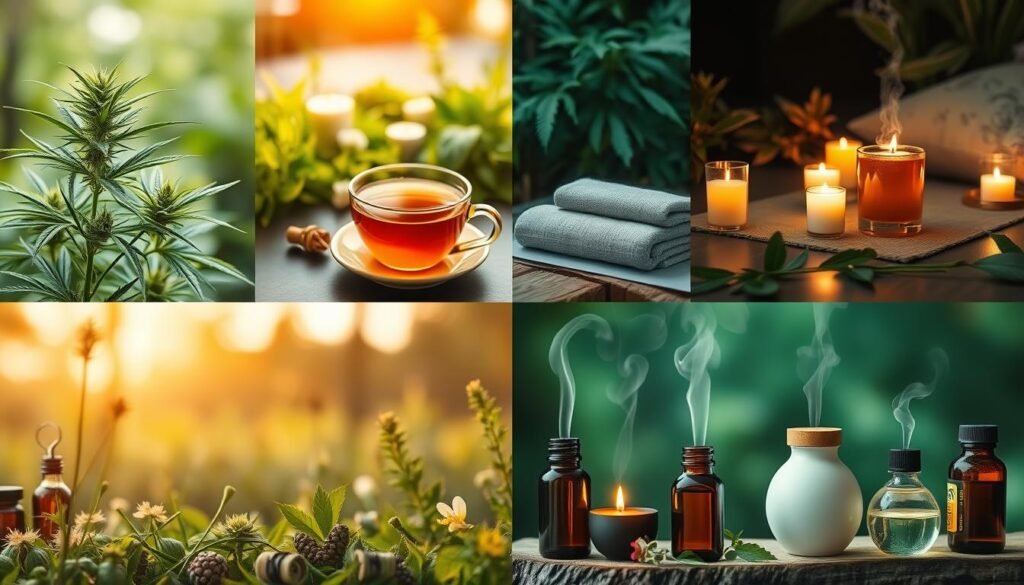About 40 million Americans over 18 face anxiety each year. Many look to cannabis for help. Cannabis research suggests CBD might ease anxiety better than THC. We’ll look into how CBD and THC differ in aiding anxiety relief, based on recent studies and what we know about their effects on mental health.
Key Takeaways
- Anxiety disorders affect 40 million Americans annually.
- CBD showed more effectiveness than THC in recent studies on anxiety relief.
- About 25% of individuals with anxiety have tried cannabis for relief.
- Larger, controlled studies are necessary to fully understand CBD’s benefits.
- Different doses of THC can either reduce or worsen anxiety symptoms.
- The legal status of CBD and THC changes by state in the U.S.
Understanding Anxiety Disorders
Anxiety disorders are a big issue in mental health across the United States. They affect about 20% of adults, making them the most common mental illnesses in the country. Anxiety’s widespread presence shows the need for effective treatments. This involves looking into cannabinoids like CBD and THC. We will explore how common anxiety disorders are in the U.S. We will also look at the usual symptoms people have.
Prevalence of Anxiety Disorders in the U.S.
Recent data shows that about 40 million adults in the U.S. are impacted by anxiety disorders. These disorders come in many shapes, affecting a large number of people. Nearly half of the population, or about 49%, have tried cannabis products to help with their anxiety. This shows how many people have anxiety disorders and are looking for different ways to treat them.
Common Symptoms of Anxiety Disorders
Common anxiety symptoms can be different for everyone, but there are some usual signs. These include:
- Persistent feelings of worry or fear
- Restlessness or being on edge
- Difficulty concentrating or focusing
- Increased heart rate
- Sleep problems, like insomnia
Knowing these symptoms is important for getting the right help and treatment. For many, figuring out their anxiety is the first step. It helps with managing it better and finding comfort.
An Overview of Cannabinoids
Cannabinoids come from the cannabis plant, with over 100 different types known. CBD and THC stand out as the most famous ones. Knowing how they differ helps us see their unique uses and benefits.
What are CBD and THC?
CBD doesn’t get you high and is sought for its healing properties. People use it for anxiety, inflammation, and nerve pain. On the other hand, THC causes the “high” feeling. While THC is often used for fun, CBD is valued for health benefits.
The Role of Cannabinoids in the Cannabis Plant
The cannabis plant offers a mix of cannabinoids. THC comes in forms like herbs, hashish, and oil. It’s mainly in marijuana, with average strengths of about 15%. CBD, however, is easier to find in the U.S. It’s usually in hemp products with very little THC, often less than 0.3%. As laws around cannabis change, knowing about these cannabinoids is key for users.
| Cannabinoid | Type | Psychoactive? | Main Uses | Source |
|---|---|---|---|---|
| CBD | Non-Psychoactive | No | Anxiety relief, inflammation, nerve pain | Hemp and cannabis |
| THC | Psychoactive | Yes | Recreation, pain relief, appetite stimulation | Marijuana |
How CBD and THC Affect the Body
Understanding how CBD and THC influence our bodies is key to unlocking their potentials. They interact with our endocannabinoid system, but in unique ways. This difference shapes their effects on anxiety relief.
CBD: Non-Psychoactive and Its Therapeutic Effects
CBD is known for not making users feel high. People have found relief from anxiety, better sleep, and less inflammation thanks to CBD. Research backs up how CBD can help improve mental health, without the high from THC. This makes CBD great for those who want its benefits without feeling intoxicated.
THC: Psychoactive Properties and Their Impact
THC has a reputation for getting users high. It does this by connecting with CB1 receptors in our brains. This can make users feel great and relaxed. However, taking a lot of THC might make anxiety worse for some.
It’s crucial to know that THC can lead to dependence, especially in young people. Studies show that teenagers who use THC might struggle more with addiction and mental health issues. This points out the importance of using THC carefully.
| Cannabinoid | Psychoactivity | Key Benefits | Potential Risks |
|---|---|---|---|
| CBD | No | Reduces anxiety, anti-inflammatory | Interactions with medications |
| THC | Yes | Relieves anxiety at low doses | Dependency, exacerbation of anxiety |
The differences between CBD and THC’s effects show how personal experiences matter in handling anxiety. Knowing how much to take and how to take it can help people choose the right option for their anxiety needs.
CBD vs THC for Anxiety: Efficacy Comparison
Anxiety affects millions, making effective treatments crucial. Recent research findings compare CBD and THC for anxiety relief. As anxiety rates rise, it’s key to know how these substances affect mental health.
Research Findings on CBD for Anxiety Relief
Studies show CBD helps with anxiety. Early findings suggest it cuts anxiety in half for young people. A study with 300 people found those using CBD felt less tense and paranoid. This suggests CBD could really help those dealing with anxiety.
Effects of THC on Anxiety Symptoms
THC and anxiety have a tricky relationship. The right doses can make you feel relaxed and happy. But too much can make anxiety worse, causing paranoia. Finding the correct dose is key to get the benefits without bad side effects. Researching doses helps tailor treatments.
Case Studies and Patient Experiences
People’s experiences with CBD and THC for anxiety vary. CBD users like its calming effect without feeling high. THC users’ experiences are mixed. Some find it relaxing; others get more anxious at high doses. This shows treatment must be customized.

| Cannabinoid | Primary Effects | Recommended Usage | Potential Risks |
|---|---|---|---|
| CBD | Reduces anxiety symptoms, non-psychoactive | Lower doses for symptomatic relief | Minimal side effects, generally well-tolerated |
| THC | Induces relaxation, may alleviate anxiety at low doses | Caution with dosing; lower doses preferred | Increased anxiety or paranoia at high doses |
Potential Side Effects of CBD and THC
Knowing the side effects of CBD and THC is key for those thinking about them for anxiety treatment options. Both offer benefits but come with risks. Learning about these side effects helps people decide if they should use them.
Common Side Effects of CBD Usage
CBD is liked for its safety. Still, it can have potential side effects. People often report:
- Fatigue
- Changes in appetite
- Diarrhea
- Dry mouth
There’s not much information on CBD’s safety. Concerns include:
High doses might harm the liver. Pregnant and nursing moms are advised to steer clear because we don’t know how it affects babies. It’s also not clear how it might impact kids’ growing brains, so it requires careful handling.
Potential Risks Associated with THC
THC can also have major side effects. People might face:
- Altered senses
- Increased heart rate
- Memory loss
- Coordination issues
- Mood changes
Using a lot over time may make things worse, like causing more anxiety for some. Also, teens might be at particular thc risks for their mental health as their brains are still developing.
Since CBD items can sometimes have THC or other harmful things, being cautious is wise. A study found that over 25% of 84 CBD products online had less CBD than shown, and some had THC. It’s best to talk with a health professional before starting any cannabinoid use to stay safe and make sure it works well.
For more info on safety and effectiveness, people can visit this resource.
Dosage Guidelines for CBD and THC
Understanding the right dosages for CBD and THC is key for addressing anxiety. It’s advised to start with low amounts. This helps figure out what works for each person. The goal is to find the ideal cbd dosage, as it varies from one individual to another.
Starting Dosage Recommendations for CBD
Studies show that starting cbd dosages for anxiety ranges between 300 to 600 mg daily. Factors such as age, weight, and individual sensitivity play a big role. It’s wise to begin with about 300 mg and increase slowly if needed. For certain FDA-approved drugs like Epidiolex, the starting point is 5 mg per kilogram of body weight. This highlights the importance of dosing based on personal needs. Websites like mydosage.com offer tools to help find the right dosage.
Understanding THC Dosage for Anxiety Treatment
Starting with approximately 7.5 mg of thc dosage is often suggested for easing anxiety. Everyone reacts differently to THC, so it’s necessary to adjust slowly. By using more CBD than THC, the treatment’s effectiveness can improve. Products with a CBD:THC ratio of over 10:1 are usually best for managing anxiety.
| Condition | CBD Dosage (mg/day) | THC Dosage (mg/day) |
|---|---|---|
| Anxiety | 300 – 600 | 7.5 or less |
| Bowel disease | 10 | N/A |
| Cancer-related pain | 50 – 600 | N/A |
| Pain management | 20:1 to 1:1 ratio | Varies |
| Psychoactive effects | N/A | 1:1 ratio for topical pain |

Legal Status of CBD and THC in the United States
The rules for CBD and THC change a lot across the United States. It’s important for buyers and health experts to understand these rules. Knowing about the legality of CBD and THC helps people follow the state laws.
Differences in State Regulations
In May 2024, the rules for CBD and THC differ by state. 24 states and Washington, D.C., allow using marijuana for fun. Also, 38 states let doctors prescribe marijuana for health reasons. For CBD to be legal, it must come from hemp and have under 0.3% THC. This shows how laws on cannabis differ across the country.
Federal Laws and CBD/THC Products Availability
The 2018 Farm Bill changed the rules under federal law. It said hemp plants with only 0.3% THC or less are not controlled substances. This helped make more hemp products available. But, the FDA has warned companies against selling foods and drinks with cannabinoids. This issue shows the fight between federal rules and the growing cannabis market.
| Aspect | CBD | THC |
|---|---|---|
| Federal Legal Status | Legal if derived from hemp with ≤0.3% THC | Illegal for recreational use; legal medically in some states |
| State Legalization for Recreational Use | Varies widely; mostly legal if under federal limits | Legal in 24 states and Washington, D.C. |
| Medical Marijuana Availability | Permitted in many states with varying regulations | Permitted in 38 states |
| FDA Regulation | Inconsistent; warnings issued for unlawful sales | Subject to restrictions; largely illegal |
Grasping the legal status of CBD and THC means looking at state and federal laws. As rules keep changing, staying updated is key for users and companies.
Alternative Anxiety Treatment Options
Many people dealing with anxiety look into different treatment options beyond cannabinoids. Today, there are more alternative treatments available. These options each have their ups and downs, giving a fuller view of how to manage anxiety.
Prescription Medications vs. Cannabis
Prescription drugs are a mainstay in treating anxiety. Selective serotonin reuptake inhibitors (SSRIs) and benzodiazepines lead the way. However, they might cause side effects like dependency and withdrawal issues.
In contrast, some turn to cannabinoid therapy, hoping for fewer side effects. CBD, for instance, shows promise in reducing anxiety symptoms without THC’s high. Comparing these treatments shows they offer different benefits and challenges.
Non-Cannabis Remedies for Anxiety
Apart from drugs, other remedies help with anxiety management. Treatments like cognitive-behavioral therapy, mindfulness, and changing one’s diet have become popular. Other options such as yoga and meditation also help, offering a more natural path to well-being.
These techniques emphasize a holistic approach. They cater to both mind and body, rounding out the options for anxiety treatment today. Each method brings its own strengths to the table.
| Treatment Option | Benefits | Drawbacks |
|---|---|---|
| Prescription Medications | Effective for many; quick symptom relief | Side effects; potential dependency |
| Cannabinoids (CBD/THC) | Potentially fewer side effects; non-psychoactive options | Legal issues; varying effects |
| Therapy (e.g., CBT) | Long-term coping strategies; reduces symptoms | Time-consuming; may require multiple sessions |
| Mindfulness Practices | Promotes relaxation; accessible | Requires commitment; not always effective for everyone |
| Dietary Adjustments | Supports overall health; can reduce symptoms | Requires lifestyle changes; slow effects |

Current Research and Future Directions
Studying the current research on cannabis for anxiety treatment shows a complicated picture. Recent studies point out the benefits of CBD for anxiety in the short term. Users feel much better using CBD, which sounds promising for cannabis research. Yet, we don’t fully understand the long-term effects.
Promising Studies on CBD and Anxiety
Many studies show CBD might really help with anxiety in different situations and for various people. In clinical trials, people said they felt less anxious after using CBD. Unlike THC, CBD doesn’t make anxiety worse, even in large amounts. This supports cannabis research that sees CBD as a way to manage anxiety.
Needed Research on Long-Term Effects of Cannabis for Anxiety
To better understand cannabis as an anxiety treatment, we need to study its effects over time. Researching CBD’s long-term impact can help find the best doses and ensure its safety. So far, research stresses the need to look at how cannabis affects mental health over the long haul. With many people facing anxiety, we must learn more to offer effective help, supporting their mental health fully.
Conclusion
CBD and THC offer different benefits for treating anxiety. CBD is often seen as safer with fewer side effects. THC, on the other hand, might not be the best for everyone. It can make anxiety worse for some people. Knowing how each affects you is key.
The acceptance of cannabis is growing, especially for mental health. Since 2018, more people are trying hemp products for anxiety relief. They’re finding it helps. Some even say it improves their mood and overall well-being. Pairing these with mindfulness can boost the journey to managing anxiety. Learn more about this at stress management guide.
Using cannabis, especially CBD and THC, can help with anxiety. But, it’s important to research and talk to a doctor. This helps create a plan that’s just right for you. Adding in lifestyle changes can further improve mental health. This makes for a full, more effective treatment plan.